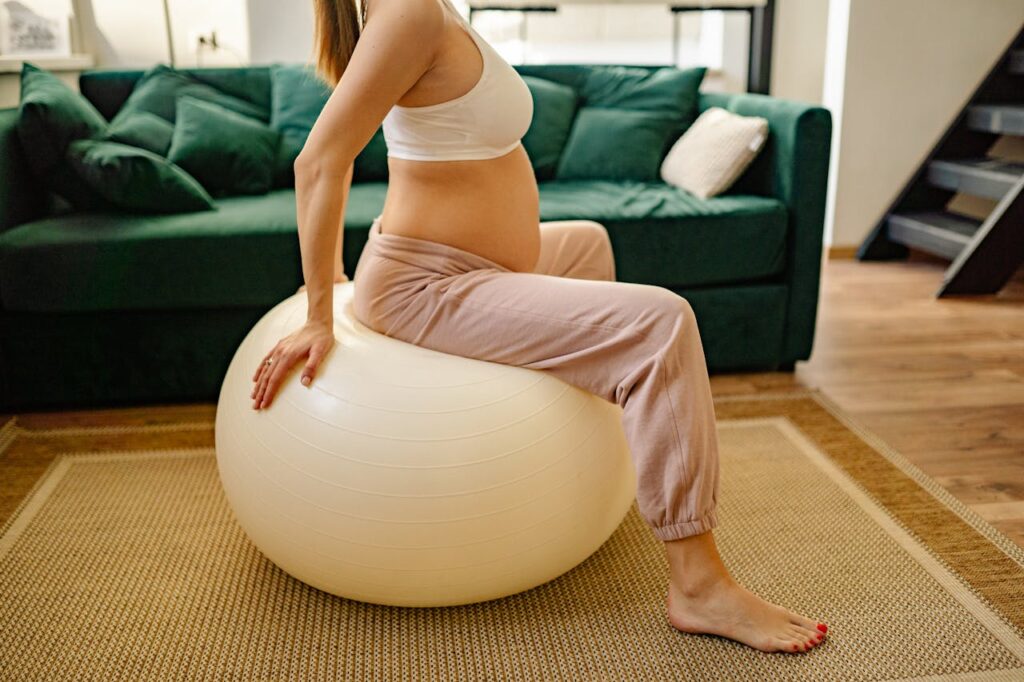Ah, the challenge of sleep during pregnancy – it’s a bit like trying to get cosy while carrying a watermelon in your stomach! Can you believe that around 78% of expectant mothers experience sleep issues? Don’t fret, soon-to-be-mom, you’re definitely not the only one facing this nighttime challenge! In this guide, we’ll delve into the various aspects of snagging that sleep while nurturing your little one. From dealing with those frequent trips to the bathroom to discovering the ideal sleeping position, we’re here to help. So, let’s jump in and uncover the secrets to achieving a peaceful night’s sleep throughout your pregnancy journey!
- Understanding Changes in Sleep During Pregnancy
- Common Sleep Challenges for Pregnant Women
- Best Sleeping Positions for Pregnant Women
- Creating a Pregnancy-Friendly Sleep Environment
- Developing a Relaxing Bedtime Routine
- Nutrition and Hydration Tips for Better Sleep
- Exercise for Improved Sleep During Pregnancy
- When to Seek Professional Help
- Conclusion
Understanding Changes in Sleep During Pregnancy

Pregnancy is a time of significant physical and hormonal changes, and these changes can have a profound impact on your sleep patterns. As your body works overtime to support your growing baby, you may find that your usual sleep habits are disrupted. Let’s dive into the specifics of how changes in sleep during pregnancy and what you can expect in each trimester.
Hormonal Shifts Affecting Sleep Patterns
During pregnancy, your body experiences a surge in various hormones, particularly progesterone and estrogen. Progesterone, often called the “pregnancy hormone,” can make you feel more drowsy during the day, but it can also lead to more fragmented sleep at night. This hormone relaxes your muscles, which can contribute to snoring and even sleep apnea in some cases.
Estrogen, on the other hand, can affect your REM sleep, potentially leading to more vivid dreams or nightmares. It’s not uncommon for pregnant women to report strange or anxiety-inducing dreams, especially as they near their due date.
Common Sleep Disturbances in Each Trimester
First Trimester:
In the early stages of pregnancy, you might find yourself feeling exhausted all the time. This fatigue is your body’s response to the surge in hormones and the energy demands of early fetal development. However, despite feeling tired, you may have trouble staying asleep due to:
- Frequent urination
- Nausea or morning sickness
- Breast tenderness
- Anxiety or excitement about the pregnancy
Second Trimester:
Many women report that their sleep improves during the second trimester. Morning sickness often subsides, and the extreme fatigue of the first trimester lessens. However, new challenges may arise:
- Leg cramps or restless legs syndrome
- Vivid dreams
- Heartburn or indigestion
- The beginning of back pain as your uterus grows
Third Trimester:
As you near your due date, sleep often becomes more challenging again. Your growing belly can make it difficult to find a comfortable sleeping position, and you may experience:
- Frequent bathroom trips due to increased pressure on your bladder
- Shortness of breath as your uterus pushes against your diaphragm
- Insomnia due to anxiety about labour and delivery
- Increased snoring or sleep apnea
How Sleep Needs Change Throughout Pregnancy
While the general recommendation for adults is 7-9 hours of sleep per night, pregnant women often need more. In the first trimester, you may find yourself needing up to 10 hours of sleep at night, plus daytime naps. This increased need for sleep typically lessens in the second trimester but may increase again in the third.
It’s important to listen to your body and rest when you need to. However, if you find that excessive sleepiness is interfering with your daily life, it’s worth discussing it with your healthcare provider, as it could be a sign of anaemia or other pregnancy-related conditions.
It’s important to keep in mind that changes in sleep patterns are quite common during pregnancy, even though they can be tough to manage. In the upcoming sections, we’ll look at some helpful strategies to ensure you get the rest you deserve during this significant period.
Common Sleep Challenges for Pregnant Women

Pregnancy can bring a host of sleep challenges that can make getting a good night’s rest feel like an uphill battle. Understanding these common issues can help you develop strategies to manage them effectively. Let’s explore some of the most frequent sleep disturbances experienced by pregnant women.
Frequent Urination and Nighttime Bathroom Trips
One of the earliest and most persistent disruptors of sleep during pregnancy is the frequent need to urinate, especially at night. This increased urge is due to several factors:
- Hormonal changes: Pregnancy hormones increase blood flow to your kidneys, causing them to produce more urine.
- Growing uterus: As your baby grows, your uterus puts pressure on your bladder, reducing its capacity to hold urine.
- Increased fluid intake: Many pregnant women drink more water to stay hydrated, which can lead to more bathroom trips.
To manage this issue, try to front-load your fluid intake during the day and reduce it in the evening hours. However, be careful not to compromise your overall hydration. When you do need to use the bathroom at night, keep the lights dim and avoid checking your phone to help you fall back asleep more easily.
Heartburn and Acid Reflux
Heartburn is another common complaint, particularly in the second and third trimesters. The burning sensation in your chest or throat can make it difficult to lie down comfortably and fall asleep. Pregnancy hormones are again the culprit here, as they relax the valve between your stomach and esophagus, allowing stomach acid to flow back up.
To minimize heartburn:
- Eat smaller, more frequent meals
- Avoid spicy, fatty, or acidic foods, especially close to bedtime
- Sleep with your head elevated using extra pillows
- Wait at least three hours after eating before lying down
If these measures don’t provide relief, talk to your doctor about safe antacids or other treatments suitable for pregnant women.
Back Pain and Discomfort
As your pregnancy progresses, the extra weight and changes in your posture can lead to back pain, particularly in the lower back. This discomfort can make it challenging to find a comfortable sleeping position.
To alleviate back pain:
- Practice good posture during the day
- Use a pregnancy pillow or regular pillows to support your back and growing belly while sleeping
- Try gentle stretching or prenatal yoga (with your doctor’s approval)
- Consider using a heating pad on a low setting before bed (but not while sleeping)
Restless Legs Syndrome
Restless Legs Syndrome (RLS) is characterized by an uncomfortable sensation in the legs and an irresistible urge to move them. It often worsens at night and can significantly disrupt sleep. While the exact cause is unknown, it’s more common for sleep during pregnancy and may be related to iron deficiency.
To manage RLS:
- Talk to your doctor about checking your iron levels
- Practice relaxation techniques before bed
- Try gentle leg stretches or a warm bath before sleep
- Avoid caffeine and nicotine, which can exacerbate symptoms
Anxiety and Stress-Related Insomnia
Pregnancy can be an emotional rollercoaster, and it’s natural to feel anxious or stressed about your changing body, the health of your baby, or the impending responsibilities of parenthood. These concerns can lead to racing thoughts at bedtime and difficulty falling or staying asleep.
To combat anxiety-related insomnia:
- Practice relaxation techniques like deep breathing or meditation
- Keep a journal to write down your thoughts and concerns before bed
- Establish a calming bedtime routine
- Consider talking to a therapist or joining a support group for pregnant women
It’s important to keep in mind that while many people face sleep challenges, you shouldn’t overlook them if they’re significantly affecting your rest. Make sure to talk to your healthcare provider about any ongoing sleep problems, as they can provide tailored guidance and suggest safe solutions to ensure you get the restful sleep you need during this vital period.
Best Sleeping Positions for Pregnant Women

Finding a comfortable sleeping position can become increasingly challenging as your pregnancy progresses. However, certain positions can help you get better rest while also promoting optimal blood flow to your baby. Let’s explore the best sleeping positions for pregnant women and why they’re recommended.
Benefits of Sleeping on the Left Side
The left-side sleeping position is often touted as the ideal position for pregnant women, especially in the second and third trimesters. Here’s why:
- Improved blood flow: Sleeping on your left side can enhance blood flow to the uterus, providing optimal nourishment to your baby.
- Reduced swelling: This position may help reduce swelling in your hands, ankles, and feet by promoting better circulation.
- Kidney relief: Sleeping on your left side can help your kidneys efficiently eliminate waste products and excess fluid from your body.
- Decreased liver pressure: This position keeps the weight of your uterus off your liver, which is located on the right side of your abdomen.
While sleeping on the left side is ideal, don’t worry if you wake up in a different position. It’s natural to shift during sleep, and brief periods in other positions are generally not harmful.
Using Pillows for Support and Comfort
Pillows can be your best friend to sleep during pregnancy, helping to support your changing body and alleviate discomfort. Here are some ways to use pillows effectively:
- Between your knees: Place a pillow between your knees to help align your hips and reduce strain on your lower back.
- Under your belly: As your pregnancy progresses, a small pillow under your belly can provide support and reduce strain on your back and hips.
- Behind your back: A pillow placed behind your back can prevent you from rolling onto your back during sleep.
- Pregnancy pillow: Many women find specially designed pregnancy pillows helpful. These come in various shapes (like C-shaped or U-shaped) and can provide full-body support.
Try out various ways to arrange your pillows to discover what feels most comfortable for you. Keep in mind that comfort is essential for a restful night’s sleep.
Positions to Avoid and Why
While finding a comfortable position is important, there are certain sleeping positions that pregnant women should try to avoid:
- Sleeping on your back: After the first trimester, lying flat on your back can cause the weight of your uterus to compress a major blood vessel called the vena cava. This can reduce blood flow to your heart and to your baby. If you wake up on your back, don’t panic – just roll onto your side.
- Sleeping on your stomach: As your pregnancy progresses, sleeping on your stomach becomes physically impossible and uncomfortable. It’s best to avoid this position as it doesn’t provide proper support for your growing belly.
- Lying completely flat: Especially in the later stages of pregnancy, lying completely flat (even on your side) can exacerbate heartburn and shortness of breath. Using pillows to elevate your upper body slightly can help alleviate these issues.
It’s important to keep in mind that these guidelines are usually relevant, but each pregnancy is special in its own way. If you have particular worries about sleeping positions, don’t hesitate to reach out to your healthcare provider. They can give you tailored advice that takes into account your unique health situation and the stage of your pregnancy.
As you face the sleep challenges that come with pregnancy, remember to be kind to yourself. It might take a little while to discover the most comfortable sleeping position, and this could shift as your pregnancy advances. The most important thing is to focus on getting enough rest and figuring out what feels best for you and your little one.
Creating a Pregnancy-Friendly Sleep Environment

Creating a cosy sleep environment is essential for everyone, but it takes on added significance to sleep during pregnancy when restful sleep can be hard to come by. By enhancing your bedroom for relaxation, you can boost your chances of achieving the quality sleep you deserve. Let’s dive into some tips for crafting a sleep haven that’s perfect for expectant mothers.
Choosing the Right Mattress and Pillows
Your mattress and pillows play a significant role in your sleep quality, especially during pregnancy when comfort is paramount.
Mattress:
- Support: Look for a mattress that provides adequate support for your changing body. A mattress that’s too soft may not support your spine properly, while one that’s too firm can create pressure points.
- Material: Memory foam mattresses can be a good choice as they conform to your body shape, but some women find them too warm. Hybrid mattresses combining innerspring and foam layers can offer a good balance of support and comfort.
- Adjustability: If budget allows, consider an adjustable bed that can elevate your head or feet as needed.
Pillows:
- Pregnancy pillow: A specialized pregnancy pillow can provide full-body support. U-shaped or C-shaped pillows are popular choices.
- Regular pillows: If you’re not using a pregnancy pillow, experiment with regular pillows. Use them between your knees, under your belly, and behind your back for support.
- Head pillow: Choose a pillow that keeps your neck aligned with your spine. You might need to adjust your pillow as your pregnancy progresses.
It’s important to keep in mind that what feels good in the early stages of pregnancy may not be as comfortable later on, so be ready to adapt as necessary.
Optimal Room Temperature and Lighting
Temperature and lighting play crucial roles in regulating your sleep-wake cycle and ensuring comfort throughout the night.
Temperature:
- Keep it cool: The ideal sleeping temperature is generally between 60-67°F (15-19°C). Pregnant women often feel warmer due to increased blood volume and metabolic rate so you might prefer the cooler end of this range.
- Breathable bedding: Use breathable, natural fabrics like cotton for your sheets and pyjamas to help regulate body temperature.
- Fan or air conditioning: Consider using a fan or air conditioning to maintain a comfortable temperature and provide white noise.
Lighting:
- Darkness for melatonin production: Ensure your bedroom is as dark as possible. Melatonin, the hormone that regulates sleep, is produced in darkness.
- Blackout curtains: Use blackout curtains or shades to block out external light, especially if you need to nap during the day.
- Dim lighting: If you need to get up during the night, use dim night lights or red-tinted lights, which are less likely to fully wake you up.
- Limit blue light: Avoid exposure to blue light from screens (phones, tablets, computers) for at least an hour before bed, as it can interfere with melatonin production.
Noise Reduction Techniques
A quiet environment can significantly improve sleep quality. Here are some strategies to reduce noise disruptions:
- White noise machine: These devices produce a constant, soothing sound that can mask other noises. Some women find that white noise or nature sounds help them sleep better.
- Earplugs: If you live in a noisy environment or have a snoring partner, consider using soft, pregnancy-safe earplugs.
- Sound-absorbing materials: Carpets, curtains, and upholstered furniture can help absorb sound and create a quieter environment.
- Address snoring: If you or your partner snore, it might be worth discussing with a doctor, as snoring can sometimes indicate sleep apnea, which can be more common for sleep during pregnancy.
- Soundproofing: For persistent external noise, consider soundproofing measures like weatherstripping doors or using soundproof curtains.
Finding the right environment to sleep during pregnancy can take some experimentation. What suits one person may not be ideal for another, so feel free to try different approaches to discover what helps you rest better. Keep in mind that quality sleep is essential for both your well-being and your baby’s, so putting in the effort to create a comfortable sleep space is definitely worthwhile.
Developing a Relaxing Bedtime Routine

Creating a calming and consistent bedtime routine can greatly enhance your sleep quality while you’re pregnant. A well-structured routine helps your body recognize that it’s time to relax and get ready for sleep. Here are some helpful tips for developing a bedtime routine that encourages more restful nights.
Establishing Consistent Sleep Schedules
Consistency is key when it comes to sleep. Try to go to bed and wake up at the same time every day, even on weekends. This helps regulate your body’s internal clock, making it easier to fall asleep and wake up naturally.
- Set a bedtime: Choose a time when you typically feel tired and stick to it as much as possible.
- Wake-up time: Try to wake up at the same time each day, even if you’ve had a restless night. This helps reinforce your sleep-wake cycle.
- Limit daytime naps: If you need to nap during the day, try to keep it short (20-30 minutes) and not too late in the day, as this can interfere with nighttime sleep.
It’s important to keep in mind that your body might need a few weeks to adapt to a new sleep routine, so stay patient and stick with it.
Relaxation Techniques
Incorporating relaxation techniques into your bedtime routine can help calm your mind and prepare your body for sleep. Here are some effective methods:
- Meditation: Even a few minutes of meditation can help reduce stress and promote relaxation. There are many pregnancy-specific guided meditations available through apps or online.
- Deep breathing exercises: Practice deep, slow breathing to help calm your nervous system. Try the 4-7-8 technique: inhale for 4 counts, hold for 7 counts, and exhale for 8 counts.
- Progressive muscle relaxation: Start from your toes and move up to your head, tense and then relax each muscle group. This can help release physical tension and promote overall relaxation.
- Prenatal yoga: Gentle, pregnancy-safe yoga poses can help stretch tense muscles and promote relaxation. Always consult with your healthcare provider before starting any new exercise routine during pregnancy.
- Mindfulness practices: Focus on the present moment, acknowledging your thoughts and feelings without judgment. This can help quiet a racing mind.
Limiting Screen Time Before Bed
The blue light emitted by phones, tablets, computers, and TVs can interfere with your body’s production of melatonin, the hormone that regulates sleep. To promote better sleep:
- Establish a “screen curfew”: Try to avoid screens for at least an hour before bed.
- Use blue light filters: If you must use devices in the evening, enable blue light filters or wear blue light-blocking glasses.
- Choose alternative activities: Instead of scrolling through your phone or watching TV, try reading a book, listening to soothing music, or engaging in quiet conversation with your partner.
Creating a Calming Pre-Sleep Ritual
Develop a series of calming activities that you perform each night before bed. This ritual can help signal to your body that it’s time to sleep. Your routine might include:
- Taking a warm bath: A soothing bath can help relax your muscles and prepare you for sleep. Just be careful not to make the water too hot, as overheating can be harmful during pregnancy.
- Gentle stretching: Light stretches can help relieve muscle tension. Focus on areas that tend to be tense, like your lower back and hips.
- Journaling: Writing down your thoughts, worries, or things you’re grateful for can help clear your mind before sleep.
- Drinking herbal tea: A warm, caffeine-free herbal tea like chamomile can be a soothing part of your bedtime routine. Just be mindful of your fluid intake to avoid extra nighttime bathroom trips.
- Light reading: Reading a book or magazine can help distract your mind from daily stresses and prepare you for sleep. Avoid suspenseful or overly engaging material that might keep you awake.
The secret to a great bedtime routine is all about consistency. It might take a little while for your body to pick up on these signals and react the way you want, so hang in there and keep at it. If you notice that some parts of your routine aren’t quite fitting, feel free to tweak and try new things until you discover what suits you best.
Creating a calming bedtime routine can enhance your likelihood of enjoying a restful night’s sleep while also fostering a soothing ritual that helps alleviate stress and anxiety throughout your pregnancy. This practice can be advantageous for both you and your developing baby, supporting overall wellness during this significant period.
Nutrition and Hydration Tips for Better Sleep

What you eat and drink can significantly impact your sleep quality, especially for sleep during pregnancy. Balancing proper nutrition and hydration with sleep-friendly habits can help you get the rest you need. Let’s explore some nutrition and hydration tips that can promote better sleep during pregnancy.
Foods that Promote Sleep During Pregnancy
Certain foods contain nutrients that can help promote sleep. Including these in your diet, especially in your evening meals or snacks, may improve your sleep quality:
Tryptophan-rich foods: Tryptophan is an amino acid that helps produce serotonin and melatonin, both of which are important for sleep. Foods high in tryptophan include:
- Turkey
- Eggs
- Cheese
- Nuts (especially almonds)
- Seeds (such as pumpkin seeds)
Complex carbohydrates: These can help increase the availability of tryptophan in the brain. Good options include:
- Whole grain bread or crackers
- Oatmeal
- Brown rice
Magnesium-rich foods: Magnesium can help relax muscles and reduce leg cramps, which are common during pregnancy. Sources include:
- Leafy green vegetables (spinach, kale)
- Nuts and seeds
- Whole grains
- Bananas
Calcium-rich foods: Calcium helps the brain use tryptophan to produce melatonin. Good sources include:
- Dairy products
- Fortified plant-based milk
- Leafy greens
Vitamin B6 foods: This vitamin helps produce melatonin. Sources include:
- Chickpeas
- Fish
- Potatoes
- Non-citrus fruits
Timing of Meals and Snacks
When you eat can be just as important as what you eat when it comes to sleep. Here are some timing tips:
- Avoid large meals close to bedtime: Eating a big meal right before bed can lead to discomfort and indigestion. Try to eat dinner at least 2-3 hours before bedtime.
- Consider a light snack before bed: If you’re hungry before bed, a small, sleep-promoting snack can be helpful. Good options might be a small bowl of whole-grain cereal with milk, a banana with a tablespoon of peanut butter, or a small handful of almonds.
- Be mindful of spicy or acidic foods: These can exacerbate heartburn, which is already common in pregnancy. If you enjoy these foods, try to eat them earlier in the day.
Balancing Hydration and Nighttime Bathroom Trips
Staying hydrated is crucial during pregnancy, but it’s also important to balance this with minimizing nighttime bathroom trips. Here are some strategies:
- Front-load your fluid intake: Try to drink more water earlier in the day and less as the evening progresses.
- Aim for adequate daily hydration: The general recommendation is about 8-10 cups (64-80 ounces) of fluid per day during pregnancy, but this can vary based on individual needs and activity levels.
- Limit fluids 1-2 hours before bed: This can help reduce the need for nighttime bathroom trips.
- Avoid diuretics in the evening: Caffeine and alcohol are diuretics that can increase urination. While alcohol should be avoided completely during pregnancy, if you do consume caffeine, try to limit it to the morning hours.
- Empty your bladder before bed: Make it a habit to use the bathroom right before you lie down for the night.
Foods and Drinks to Avoid for Better Sleep During Pregnancy
Some foods and drinks can interfere with sleep, especially when consumed close to bedtime:
- Caffeine: Found in coffee, tea, chocolate, and some sodas, caffeine can stay in your system for several hours and disrupt sleep. If you do consume caffeine, try to limit it to the morning hours.
- Spicy foods: These can cause heartburn and indigestion, particularly when lying down.
- High-fat foods: Foods high in fat take longer to digest and can cause discomfort that interferes with sleep.
- Excessive liquids: While staying hydrated is important, drinking too much close to bedtime can lead to frequent bathroom trips.
- Sugary foods: These can cause a spike in blood sugar followed by a crash, which might wake you up in the middle of the night.
It’s important to keep in mind that each woman’s nutritional requirements and tolerances can vary, particularly during pregnancy. What suits one individual may not be suitable for someone else. Be mindful of how various foods influence your sleep and make dietary adjustments as needed. Always seek guidance from your healthcare provider or a registered dietitian for tailored nutritional advice during this special time.
Being aware of your eating and drinking habits, along with the timing, can help you align with your body’s natural sleep patterns, enhancing your chances of enjoying restful sleep during pregnancy. This approach not only benefits your health and well-being but also supports the development of your growing baby.
Exercise for Improved Sleep During Pregnancy

Regular exercise during pregnancy can have numerous benefits, including improved sleep quality. However, it’s important to approach exercise safely and in a way that supports your changing body. Let’s explore how physical activity can enhance your sleep and what types of exercises are most beneficial during pregnancy.
Safe Pregnancy Exercises for Better Sleep
Always consult with your healthcare provider before starting or continuing any exercise routine during pregnancy. Generally, the following exercises are considered safe and can promote better sleep:
- Walking: A brisk walk is an excellent, low-impact exercise that can improve cardiovascular health and help tire you out for better sleep.
- Swimming: The buoyancy of water can provide relief from the extra weight you’re carrying, making swimming or water aerobics an excellent choice.
- Prenatal yoga: Gentle stretching and breathing exercises can help relax your body and mind, preparing you for sleep.
- Stationary cycling: This low-impact exercise can provide a good cardiovascular workout without putting stress on your joints.
- Strength training: Light weight training or bodyweight exercises can help maintain muscle tone and improve posture, potentially reducing discomfort that might interfere with sleep.
- Pelvic floor exercises: Kegel exercises can help strengthen the pelvic floor muscles, which support the uterus, bladder, and bowels. Strong pelvic floor muscles can help reduce nighttime bathroom trips.
It’s important to pay attention to your body and steer clear of any exercises that lead to pain or discomfort. As your pregnancy advances, you might find it necessary to adjust your routine to better suit your evolving body.
Timing of Workouts for Optimal Sleep Benefits
When you exercise, it could be just as important as what exercises you do. Here are some timing considerations:
- Morning or afternoon exercise: Many women find that exercising earlier in the day helps them sleep better at night. Morning exercise can help regulate your body’s circadian rhythm, while afternoon exercise can help combat the mid-day energy slump.
- Avoid intense exercise close to bedtime: Vigorous exercise too close to bedtime can be stimulating and make it harder to fall asleep. Try to finish any intense workouts at least 3 hours before bedtime.
- Gentle evening exercises: Light stretching or relaxation exercises in the evening can be part of a calming bedtime routine. Prenatal yoga or gentle stretching can be particularly beneficial.
- Consistency: Try to exercise at the same time each day. This can help regulate your body’s internal clock and improve sleep patterns.
Gentle Stretches to Relieve Discomfort Before Bed
Incorporating some gentle stretches into your bedtime routine can help relieve tension and prepare your body for sleep. Here are a few pregnancy-safe stretches:
- Cat-Cow Stretch: On your hands and knees, alternate between arching your back (cow) and rounding it (cat). This can help relieve back pain.
- Child’s Pose: Kneel on the floor with your knees wide apart and stretch your arms forward. This can help stretch your lower back and hips.
- Standing Forward Bend: Stand with your feet hip-width apart and gently bend forward, letting your arms hang down. This can help stretch your lower back and hamstrings.
- Seated Spinal Twist: Sit on the floor with your legs extended. Bend your right knee and place your foot outside your left thigh. Gently twist to the right, placing your left elbow on the outside of your right knee. Repeat on the other side.
- Leg-Up-the-Wall Pose: Lie on your back with your buttocks close to a wall and extend your legs up the wall. This can help reduce swelling in your legs and feet.
Remember to perform these stretches gently and stop if you feel any pain or discomfort.
Precautions and Modifications
As your pregnancy progresses, you may need to modify your exercise routine:
- Avoid exercises that require lying flat on your back after the first trimester, as this can reduce blood flow to the uterus.
- Be cautious with balance: As your centre of gravity shifts, be careful with exercises that require balance to avoid falls.
- Stay cool: Avoid exercising in hot, humid conditions and drink plenty of water to prevent overheating.
- Wear supportive clothing: A good sports bra and supportive shoes are essential.
- Don’t overexert yourself: You should be able to carry on a conversation while exercising. If you can’t, you’re working too hard.
Benefits of Regular Exercise on Sleep Quality
Regular exercise during pregnancy can improve your sleep in several ways:
- Reduces stress and anxiety: Physical activity can help reduce stress hormones that might interfere with sleep.
- Promotes physical tiredness: Regular exercise can help you feel more physically tired at the end of the day, making it easier to fall asleep.
- Regulates circadian rhythms: Consistent exercise can help regulate your body’s internal clock, promoting better sleep-wake cycles.
- Improves mood: Exercise releases endorphins, which can improve your overall mood and reduce symptoms of depression that might interfere with sleep.
- Reduces pregnancy discomforts: Regular exercise can help alleviate common pregnancy discomforts like back pain and constipation, which might otherwise disturb your sleep.
It’s important to keep in mind that exercise can be great during pregnancy, but you should always pay attention to how your body feels. Be sure to talk to your healthcare provider about the best exercise plan for you. Every pregnancy is different, and what might be good for one person may not be the best choice for someone else.
By incorporating safe, regular exercise into your routine, you’re not only promoting better sleep but also contributing to your overall health and well-being during pregnancy. This can have positive effects on both you and your developing baby.
When to Seek Professional Help

Sometimes, it’s crucial to seek help from professionals. Let’s talk about the right moments to connect with sleep specialists.
Persistent Insomnia: When Counting Sheep Isn’t Cutting It
If you’ve been tossing and turning for weeks or even months, it’s time to seek help. Chronic insomnia isn’t just frustrating; it can have serious health implications. A sleep specialist can help identify the root cause and develop a tailored treatment plan. Don’t suffer in silence – there’s no need to be a sleep martyr!
Sleep Apnea Symptoms: More Than Just Snoring
Sleep apnea is a serious condition where breathing repeatedly stops and starts during sleep. If your partner complains about your loud snoring, or you wake up gasping for air, it’s time to see a doctor. Other signs include excessive daytime sleepiness and morning headaches. Treating sleep apnea isn’t just about better sleep – it’s about your overall health and well-being.
Chronic Fatigue: When Tired Is Your Default Setting
Feeling constantly exhausted, even after a full night’s sleep? This could be a sign of an underlying health issue. Chronic fatigue can be linked to conditions like thyroid problems, anaemia, or even depression. A healthcare professional can help determine if your tiredness is sleep-related or if there’s something else at play.
Depression and Anxiety: The Mental Health Connection
Mental health and sleep are closely intertwined. If you’re experiencing persistent low mood, anxiety, or changes in sleep patterns, it’s crucial to seek help. A mental health professional can provide strategies to manage these issues, which often leads to improved sleep as well.
Sleep-Related Behaviors: When Things Go Bump in the Night
Sleepwalking, night terrors, or other unusual behaviours during sleep (known as parasomnias) can be distressing and potentially dangerous. If you or a loved one experiences these regularly, it’s time for a professional evaluation. These issues often have underlying causes that can be addressed with proper treatment.
Medication Side Effects: When Your Pills Keep You Up
Sometimes, the very medications meant to help us can interfere with our sleep. If you suspect that your prescriptions are affecting your sleep, don’t just stop taking them! Talk to your doctor about adjusting dosages or finding alternatives. There’s often a solution that can treat your condition without sacrificing your sleep.
Impact on Daily Life: When Poor Sleep Takes Over
If sleep issues are interfering with your work, relationships, or overall quality of life, it’s time to get help. Sleep isn’t a luxury; it’s a fundamental pillar of health. A sleep specialist can help you reclaim your nights and improve your days.
Sleep Studies: Getting to the Bottom of It
Sometimes, the best way to understand what’s happening during your sleep is through a professional sleep study. These tests can diagnose conditions like sleep apnea, restless leg syndrome, and other sleep disorders. It might seem daunting, but think of it as a fact-finding mission for better sleep!
It’s important to remember that asking for help with sleep problems is not a weakness; it’s a wise move towards improving your health and overall well-being. Your well-rested self in the future will definitely appreciate it!
Conclusion
We’ve explored so much in our journey to achieve better sleep during pregnancy! From creating cosy pillow setups to perfecting your nighttime routine, you now have the tools to combat those sleepless nights. Keep in mind that every pregnancy is different, and what helps one expectant mother may not suit another. Feel free to try out different strategies to discover what works best for you. As you navigate this amazing experience, take time to enjoy those restful moments – they’re essential for gearing up for the adventure of parenthood! So, soon-to-be mom, what’s your biggest sleep hurdle at the moment, and which of these tips are you eager to implement first?


